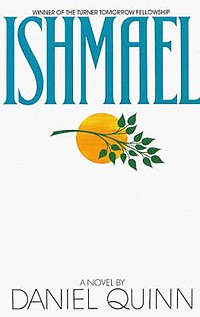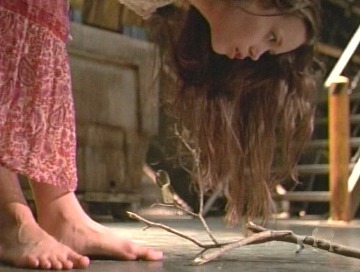I've heard people say something like this before, but usually it turns out that they just don't understand what evolution is. They typically mean something like
In the 'wild', people who (can't see / can't walk / have regular seizures / have acute ashma / have low sperm counts / etc.) would not survive to reproduce, thus the human species would tend to select for the opposite traits. Thanks to modern medicine we allow these traits to continue to occur, and potentially proliferate in our gene pool, resulting in a weaker human population over time.
Or to put it colloquially, "our technology means that the human species is getting worse." (The problem with that statement, of course, is that evolution doesn't say anything about "better" or "worse" but merely about "more fit" and "less fit" to survive in a given niche.)
Consider that civilized humans transform available land from its wild state to a food-producing state. We do this rapidly and efficiently, thereby allowing us to produce corresponding increases in food supply. Whereas non-civilized peoples have allowed food supply to limit their numbers ("living in the hands of the gods"), we have effectively removed the limits on food availability for nearly all humans on earth. In this way, a limited food supply is not a significant factor in the gene selection of civilized people.
Consider that civilized humans will, without hestiation, obliterate obstacles to increasing food supply for humans. Cows like to graze pasture, so we'll destroy rain forests extremely rapidly ( 100 acres / minute!), destorying the "inconsequential" life in that area, so that our cows may graze. If wolves show interest in our cows, we won't just defend the cows when the wolves approach. We systematically seek out and destroy all wolves, nearly eliminating them as a species, on purpose. We make the decisions about which species thrive and which are decimated. For millions of years, the selection was made by a complex mix of natural forces; for the past 10,000 years, we have taken that decision in to our own hands. We decide who lives and who dies.
The universe if full of diversity. Each blade of grass is unique. Each plant is unique. Each mammal is unique. Each species is unique. Just as the Law of Gravity is written in every particle of matter, the Law of Life is written in every living thing. Diversity of life is at the essense of that law. Diversity of life is at the essense of the theory of natural selection. Civilized man has dramatically reduced the diversity of life on the earth, by driving some species to extinction, while we allow others to proliferate almost unchecked. The result dismantles the normal functioning of evolution by natural selection.
Natural selection is the process by which favorable traits that are heritable propagate throughout a reproductive population: individual organisms with favorable traits are more likely to survive and reproduce than those with unfavorable traits. If these traits have a genetic basis, then the genotypes associated with the favored traits will increase in frequency in the next generation. Given enough time, this passive process results in adaptations and speciation (see evolution). Natural selection explains why living creatures seem to match their environmental niches so well.
Natural selection is one of the cornerstones of modern biology. The term was introduced by Charles Darwin in his groundbreaking 1859 book The Origin of Species, [1] by analogy with artificial selection, by which a farmer selects his breeding stock.





